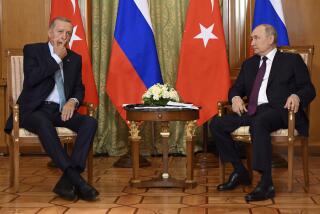Yeltsin Takes Risk, Ends Bread Subsidy
- Share via
MOSCOW — With a stroke of the pen, Russian President Boris N. Yeltsin on Saturday abolished what had been one of the first and most durable gains of Soviet communism--cheap, government-subsidized bread for the masses.
In a presidential decree that carries a formidable political risk, Yeltsin authorized local authorities in Moscow, St. Petersburg and throughout Russia to lift government-imposed price ceilings on bread and a range of other staples, including milk, sugar, salt, low-fat cottage cheese, fermented milk, vegetable oil and matches.
Under Yeltsin’s order, made public by the Tass news agency, the cost of those essentials will now be allowed to seek its true market level, such as occurred for a much wider list of foodstuffs and other products when their prices were decontrolled Jan. 2 and which have since soared as much as 30 times in cost to the consumer.
Yeltsin’s Jan. 2 decree had fixed new, higher ceilings on the prices of bread and other basic commodities, but after Saturday’s decree, controls remain on the prices of only a few items, including rents, medicines, baby food and such utilities as hot water and heat.
Of all basic commodities, bread has unparalleled importance for the Russian populace because it constitutes something like one-fifth of the average person’s diet and was kept cheap and in abundant supply by Moscow authorities for decades.
In paying keen attention to bread, the Communists and the political forces that succeeded them were only heeding the lessons of history: riots in St. Petersburg caused by bread shortages were one of the causes of the 1917 Russian Revolution, and V.I. Lenin and his Bolsheviks came to power on a platform of “peace, land, bread.”
The price increases sure to occur now are certain to deal another blow to consumers who have already had to face at least a threefold increase in the cost of living since January. Tacitly recognizing the inherent political danger, Yeltsin’s decree recommends that local authorities plow money now spent on subsidies--tens of billions of rubles were expended yearly to underwrite bread alone--into “social defense” funds for Russia’s most disadvantaged people.
The decree also gives city and regional authorities the option of subsidizing local bakeries that turn out the cheapest, most basic kinds of bread. Some may do so, but the days are clearly over when the national government kept the price of bread so insignificant that farmers gave it to their livestock in lieu of grain.
However, even the price ceilings abolished by Yeltsin’s latest decree had allowed what, for Russians, was a shocking leap in the price of a loaf when they went into effect Jan. 2. For example, one survey of Moscow bakeries found last week that white bread was selling for 4.20 rubles (about 4.6 American cents at the prevailing commercial exchange rate), or 700% of the pre-Jan. 2 price.
A relatively rapid end to state subsidies, along with privatization of government assets and fiscal and budgetary reform, are part of Yeltsin’s program to wean the Russian economy rapidly away from centralized controls and institute a market system.
More to Read
Sign up for Essential California
The most important California stories and recommendations in your inbox every morning.
You may occasionally receive promotional content from the Los Angeles Times.













